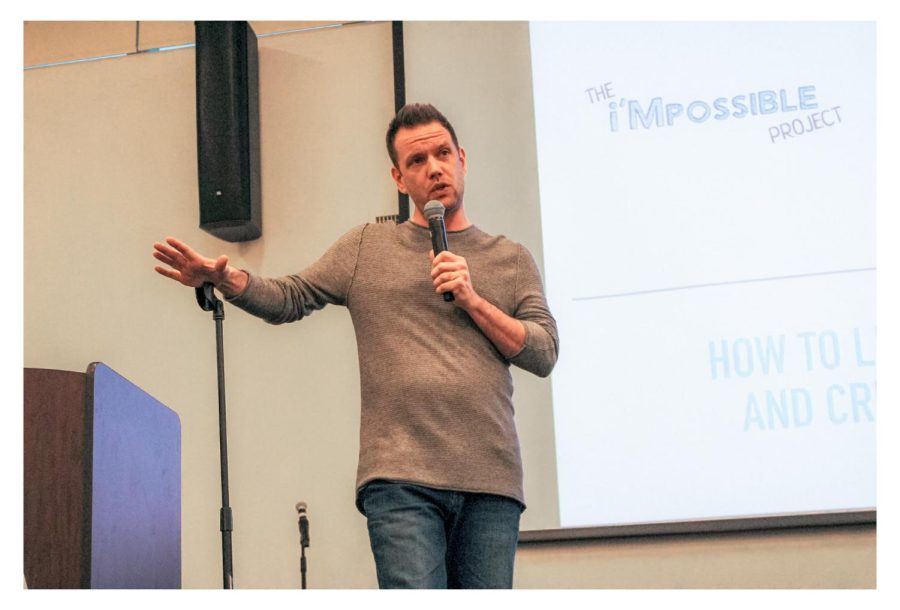Self-care is not selfish: mental wellness talk with Josh Rivedal
Mental health speaker Joshua Rivedal came to Winona State University on March 28 to speak about his struggles and experiences. “You can’t change someone. They’re not broken, they’re bent,”
April 5, 2023
The Kryzsko Ballroom that was once filled with chatter and cookies soon settled down as Josh Rivedal took the stage.
“They should’ve called this event ‘extra credit and free cookies,’” Rivedal commented, laughing.
Following Tina VanSteenbergen’s talk titled “The Audacity: Taking Up Your Space in the World” on March 21, Rivedal gave his talk titled “How to Live Mentally Well and Crush it in College” on March 28.
After easing the audience in with some jokes, Rivedal opened up about his story.
Showing us a glimpse into his life, Rivedal shared that he grew up poor in the hoods of New Jersey. Rivedal’s father was a Decan for their church. Since they were so strong in their faith, Rivedal said his family presented to the world that they were perfect. He explained that they were far from it.
With a physically and emotionally abusive father and low funds to be able to afford to simply exist, this chain of negative events affected him significantly. Rivedal knew something was wrong with him, but he did not have a word for it.
Rivedal then posed the question, ‘What happens when we do not talk about the bad stuff?’
At his young age, Rivedal explained that he did not have the tools or vocabulary he needed to cope.
“I didn’t like that man, but I loved him,” Rivedal would later remark about his father years later.
Rivedal shared that the chain of negative effects has caught up to his father as well. March 31, 2009, was the day before the divorce was finalized between Rivedal’s father and mother after 30 years of marriage. On that day, when Rivedal was 25, his father died by suicide at the age of 60.
This added another link to this negative chain of events that has been tying Rivedal down.
Rivedal said he went 20 years without a diagnosis. This was mostly because he never had any role models growing up and felt that he had to follow the toxic masculinity view of ‘boys don’t cry’. So because of this, he felt that he did not need to talk about the bad stuff.
“[A Diagnosis] is not a death sentence,” Rivedal said.
Once diagnosed with Clinical Depression and Generalized Anxiety Disorder, Rivedal finally had a word for what he was feeling.
“We don’t talk about it properly in our society,” Rivedal said.
He later ripped down the veil on the negative societal view of mental health. Rivedal said that mental health and mental illness are not the same and that when we are not on the same page there is no changing social stigma.
“Sometimes I’m not missing anything, it’s just the chemicals [in the brain],” Rivedal said.
After taking a sip of water he explained that what is good for some is not good for others. After his father’s suicide, Rivedal started to spiral over many months. He felt that there was no one there who would love or care for him.
“I didn’t think that because I wanted attention or that I was crazy…I was unwell,” Rivedal said. “What I was going through was treatable and manageable, but I didn’t realize that at the time.”
Rivedal explained that major changes all at once can be the catalyst of suicide ideation.
When a person is isolating or acting recklessly, they can be showing signs of suicidal ideation. Rivedal said that having a person say that they can see you and want to learn more about your situation is vital.
Fourth-year student Marget Klahr came to the event for not only the extra credit but also because she thought the topic was worthwhile as she is going to graduate school for a certificate in Mental Health Education in Schools and Organizations.
“Everyone copes differently,” Klahr said. “[Rivedal] has comedic relief and he even made a career out of that from his trauma.”
Liz Carman is a second-year student who occupies the Student Services chair of Student Senate. Senate was connected with Rivedal over social media during Winter Break and has been working since December to put this event on.
“My intention was to get a mental health keynote speaker that had personal experience. I was super excited to get someone that went through loss, grief, depression and anxiety so that people could relate,” Carman said. “[Senate] agreed that this is something that is important and that we should talk about. We don’t have a lot of speakers that have that personal experience because a lot of people don’t want to talk about it.”
After being asked if voicing mental health on college campuses is important, Rivedal said “Stories move the needle. We know that mental health is important and we know that people need to engage in their own well-being. If I tell about what I’ve been through…it’s going to model that behavior for someone else.”
After telling his story, Rivedal explained that we need to build up our support system before we need it. So, set up that therapy appointment you are feeling hesitant about. Talk to that person you have wanted to talk to. Start that self-care routine. Starting something is progress to bettering mental health
“Especially during difficult times, we need as many allies and friends as possible,” Rivedal said.
Rivedal explained ways to have a validating and meaningful conversation with someone going through suicidal ideation. Switching out old phrases with new ones allows a person to feel seen and heard. Instead of saying ‘I know how you feel’ say ‘tell me more’ and instead of saying ‘it’ll get better’ say ‘it’ll get different’.
Rivedal also said to always be focused on learning rather than coming up with a response or solution for someone. Using these phrases reveals that growth is not a linear process. Rivedal said these phrases mean that it will not always get ‘better’ but that it will get different.
“You can’t change someone,” Rivedal emphasized, “they’re not broken, they’re bent.”







































































